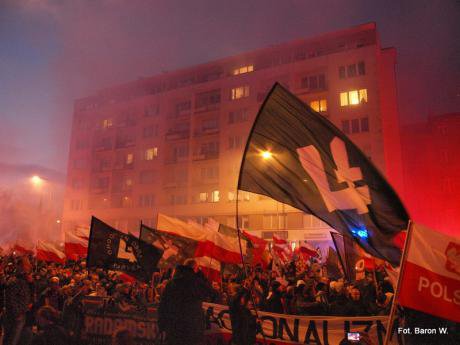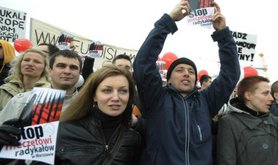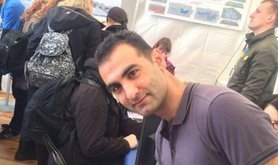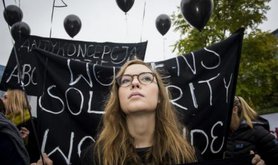

Marsz Niepodlegości, 2013, with the Falanga symbol. Wikicommons/Wiktor Baron. Some rights reserved.
Throughout its history, public protests for human rights have been a common element of the political landscape in Poland. One might think Poles have always had their moral compasses set to protecting freedom and equality of all, with history having taught them the value of free speech and respect for minorities. Yet the turbulences that have recently rocked many boats thus far steadily steering towards European unity have also influenced the Polish human rights perimeter.
Facebook was among the first to realize this shift, when it disabled access to discriminatory content inciting ethical and religious discrimination and was promptly accused of censorship and curtailing free speech not only by those directly affected, but also by ruling politicians. Last month the Polish minister for digital affairs met with Facebook to discuss hate speech and censorship, but the traditional role usually adopted by a democratic government, seems reversed in this dialogue.
Who is right in Poland?
Those who most recently hold the monopoly on being right in Poland are on the far right. It was the poster for the traditional “Independence March”, a yearly event organized to celebrate the country’s independence day on November 11 that provoked the most recent peculiar confrontation between Facebook, Polish nationalists and politicians on hate speech, free speech and censorship. The “Independence March” usually results in material losses and street fighting, necessitating enhanced police protection, yet despite the changing political options consecutive local administrative authorities have been allowing it in the name of free speech and freedom of assembly.
This year the march was organized, among others, by the All-Polish Youth society (Młodzież Wszechpolska). It is a nationalist organization, which usually uses the Falanga to represent itself - a graphic symbol of an arm raising a sword, used in 1920s by Polish nationalists. In its activity it also refers to the Celtic cross (banned in e.g. Germany, where it is considered to promote Nazism) and a graphic statement against homosexuality referred to as the “No way for gay” sign (“zakaz pedałowania”). It was the Falanga that appeared on the controversial poster promoting the 2016 Independence March, emphasizing the role Poland is to play as the “bulwark of Europe” (“Polska bastionem Europy”) – the Catholic country to defend Europe against the Muslim threat.
This statement follow others made by the organization earlier this year, just to mention the public protest against “muslimisation of Europe” held in Cracow and Warsaw in February 2016. While the All-PolishYouth has long been criticized by human rights advocates across Europe for its discriminatory policy, the recent currents of European politics brought its activity to the forefront of national policy making. While local courts and politicians declined to see the discriminatory content of this dangerous political trend, human rights activists turned to Facebook – the biggest online community and its self-regulation mechanism to stop the racist propaganda online. And Facebook lived up to the challenge. For three days.
The religious bulwark of Europe
On November 1, Facebook blocked the page of a Polish MP, Marek Jakubiak, who promoted the Independence Day march on his Facebook wall, following complaints from those who found the call to defend Europe against non-believers discriminatory.
Access was also disabled to FB pages of All-Polish Youth and other right-wing organizations promoting the march. The takedown followed community protests: complaints made by users who felt the march itself as well as its advertising were discriminatory and hateful. The complainants indicated the discriminatory content of the posts. Facebook later referred directly to the Falanga symbol, visible on the official posters, as a direct reason for the takedowns of hateful, discriminatory content.
However the predictable arguments of the company – that the takedowns followed community standards and mass user complaints – failed to satisfy the right wing activists. They did use the portal to promote their activity and seek community funding from mass followers per voluntary donations so the loss of advertising opportunity shortly before the march was particularly throbbing. Jakubik and his followers threatened legal action against the company. The MP claimed his freedom of speech was violated and used his public role to emphasize the ‘threat’ Facebook represented to the public discourse in Poland, as he was banned for “being proud to be Polish”. Employees of a Polish Facebook branch were identified as left-wing lobbyists pursuing their political sympathies, influencing the Dublin-based community review teams of the company. While the calls for the Internal Security Agency to go after Facebook were not yet followed by actions, the clear statement from Polish ministers, including the Minister for Digital Affairs who strongly criticized Facebook for censorship, banning posters promoting a perfectly legal public gathering in Poland, made Facebook lift their ban within the next few days.
A new Europe and its bulwarks
A couple of years ago any statement calling to “defend a country against aliens” and the “threat of muslimisation”, emphasizing the unique role a certain nationality has to play in defending religious values, was widely recognized as the very definition of hate speech across all European countries.
In 2016 this assessment is no longer as obvious. One could even argue that the European Human Rights Convention, drafted in 1950 is no longer reflective of the values Europe stands for in 2016. While social networks, their “black-box” algorithms and community standards have long been criticized, also by this author, as not reflective of the rule of law, required by European human rights laws, it seems that those exact flexible standards and the moral sense of the community for the first time outweighed what remains of the European values in 2016. This worrying trend is also well visible in other European countries, just to mention the latest Swiss campaign against naturalization of Muslims. Business is naturally inclined to adapt to the wishes and choices of its “customers” – just how much their tastes have changed in recent years has yet to be seen. But a situation where a commercial, US-based enterprise stands against clear examples of hate speech and is criticized by national authorities is unprecedented in modern European history.
Read more
Get our weekly email



Comments
We encourage anyone to comment, please consult the oD commenting guidelines if you have any questions.